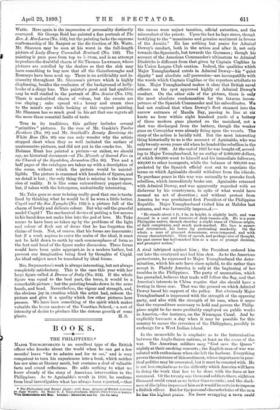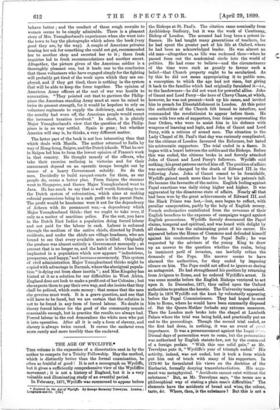BOOKS.
THE PHILIPPINES.* MAJOR YOUNGRUSBAND is an excellent type of the British officer who knocks about the world when he can get a few months! leave "for to admire and for to see," and is very competent to turn his experiences into a book, which neither has nor aims at literary merit, but contains a deal of valuable facts and sound reflections. He adds nothing to what we know already of the story of American intervention in the Philippines. As to Againaldo's revolt in 1896, he confirms from local investigation what has always been reported,—that
• The'Philipptries and Round About: with Some Account of British Interests (a those Waters. By Major G. J. Younghusband, Queen's Own Corps of Guides. With Illutrations and Map. London Maasndian and Co. Vs. 6d. Asti
the causes were unjust taxation, official extortion, and the misconduct of the priests. Upon the last he lays stress, thouglf testifying to the "unanimous and genuine sentiment in favoui of the Jesuits." He has nothing but praise for Admiral Dewey's conduct, both in the action and after it, not only towards the Spaniards, but towards the Germans ; though his account of the American Commander's ultimatum to Admiral Diedrichs is different from that given by Captain Coghla.n in his Union League Club oration. Indeed, the qualities which Major Younghusband extols in Admiral Dewey—his "quiet dignity" and absolute self-possession—are incompatible with the words which Captain Coghlan or the reporters attribute to him. Major Younghusband makes it clear that British naval officers on the spot approved highly of Admiral Dewey's conduct. On the other aide of the picture, there is only the most absolute condemnation for the fatuous incom- petence of the Spanish Commander and his subordinates. We had not realised that when Dewey's fleet steamed into the narrow entrance of Manila Bay, passing in line at six knots an hour within eight hundred yards of a battery of three modern guns planted on the mainland, not a shot was discharged from the battery, though the weaker guns on Corregidor were already firing upon the vessels. The story of the action is lucidly told. But the most interesting thing historically to us is the account of Aguinaldo, who was only twenty-seven years old when he headed the rebellion in the summer of 1896. At the end of 1897 he was bought off, accord- ing to Major Younghus band, by an outlay of 2,000,000 dollars, of which 800,000 went to himself and his immediate followers, 400,000 to other insurgents, while the balance of 800,000 was pocketed by the Spanish official sent out to negotiate the terms on which Aguinaldo should withdraw from the islands.
To purchase peace in this way was naturally to provoke fresh rebellion, which immediately broke out. Aguinaldo returned with Admiral Dewey, and was apparently regarded with no disfavour by his countrymen, in spite of what would have seemed an act of desertion ; and without protest from America he was proclaimed first President of the Philippine Republic. Major Younghusband visited him at Malolos last autumn, and was favourably impressed :— "He stands about 5 ft. 4 in. in height, is slightly built, and was dressed in a coat and trousers of drab tussore silk. He is a pure Philippine native, though showing a slight trace of Chinese origin, of dark complexion, and much pock-marked. His face is square and determined, his lower lip protruding markedly. On the whole a man of pleasant demeanour, even-tempered, and with strong characteristics. Slow of speech, and perhaps also of thought, his past career has hall-marked him as a man of prompt decision, and prompter action."
A rival intrigued against him ; the President ordered him out into the courtyard and had him shot. As to the American protectorate, he expressed to Major Younghusband the deter- mination, which his acts have since upheld, to die rather than accept it. Plainly America is only at the beginning of her troubles in the Philippines. The party of annexation, which has prevailed, believes that trade will follow the flag, and that America's interests in China require that she should have a footing in those seas. That was the ground on which Admiral Dewey based his support of the policy. But obviously Major Younghusband is impressed with the strength of the opposing party, and also with the strength of its case, when it urges that the expenditure necessary to hold and govern the Philip- pines might be far more profitably employed on public works in America,—for instance, on the Nicaragua Canal. And he explicitly foreensts a day when it may be possible for this country to secure the reversion of the Philippines, possibly in exchange for a West Indian island.
In the meanwhile he is emphatic as to the fraternisation between the Anglo-Saxon nations, at least on the scene of the war. The American soldiers sang "God save the Queen" nightly at their smoking concerts ; the English man-of-war was saluted with enthusiasm when she left the harbour. Everything proves theexistence of this sentiment, whose importance in prac- tical politics may htf overrated, but it must be counted with. He is not less emphatic as to the difficulty which America will have in doing the work that has to be done with the force at her command. Of the twenty-one thousand soldiers there, eighteen thousand could count as no better than recruits; and the slack- ness of discipline impressed him as it would be certain to impress a British officer. But for the Personal characteristics of the men he has the highest praise. No force occupying a town could behave better ; and the conduct of these rough recruits to women seems to be simply admirable. There is a pleasant story of Mrs. Younghusband's experiences when she went into the town to buy the photographs which adorn the book (very good they are, by the way). A couple of American privates hearing her ask for something she could not get, recommended her to another shop and escorted her to it ; there fresh inquiries led to fresh recommendations and another escort. Altogether, the picture given of the American soldier is a thoroughly pleasant one, but it leads one to the conclusion that these volunteers who have engaged simply for the fighting will probably get tired of the work upon which they are em- ployed, and if they get tired, there is nothing in the system that will be able to keep the force together. The opinion of American Army officers at the seat of war was hostile to annexation. "They pointed out that to garrison the Philip- pines the American standing Army must at once be raised to twice its present strength, for it would be hopeless to rely on volunteer regiments to supply the deficiency, and that, once the novelty had worn off, the American people would resent the increased taxation involved." In short, it is plainly Major Younghusband's view that the question of the Philip- pines is in no way settled. Spain is gone ; but whether America will stay is, he thinks, a very different matter.
The latter part of the book is not less interesting than that which deals with Manila. The author returned to India by way of Hong-kong, Saigon, and the Dutch islands. What he saw in Saigon led him to form the lowest opinion of France's work in that country. He thought meanly of the officers, who take their exercise reclining in victories and for their amusement depend on an operatic troupe brought out by means of a heavy Government subsidy. So do the men. Decidedly to build racquet-courts for them, as our people do, seems a better plan. From Saigon the steamer went to Singapore, and thence Major Younghusband went to Java. He has much to say that is well worth listening to on the Dutch system of colonisation, which aims at making colonial possessions bring in a cash profit to the parent State. The profit would be handsome were it not for the dependency of Acheen with its permanent war,—a dependency which Major Younghusband think 4 that we ought to take over, if only as a matter of maritime police. For the rest, you have in the Dutch East Indies a population doing forced labour and not paid for the labour in cash. Labour is enforced through the medium of the native chiefs, directed by Dutch residents, and under the chiefs are village headmen, who are bound to see that every available acre is tilled. Originally the produce was almost entirely a Government monopoly ; at present that is no longer so, and the habit of labour has been implanted in a population which now appears "industrious, prosperous, and happy," and increases enormously. This system of civil administration Major Younghusband thinks might be copied with advantage in Burmah, where the aboriginal popula- tion " is dying out from sheer inertia " ; and Miss Kingsley has hinted at it as a solution for our difficulties in West Africa. England does not look to make a profit out of her Colonies ; but she expects them to pay their own way, and she insists that they shall be policed, which costs money: that means that the men she governs must work. It is a grave question, and one that will have to be faced, but we are certain that the solution is not to be found in any form of forced labour. No doubt in theory forced labour for the good of the community sounds reasonable enough, but in practice the results are always bad. Forced labour in the end demoralises the white men who put it into operation. After all it is only a form of slavery, and slavery is always twice cursed. It curses the enslaver even more surely and more terribly than the enslaved.























































 Previous page
Previous page